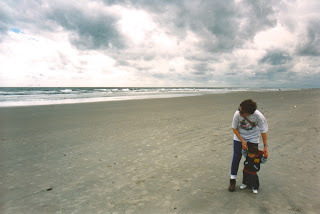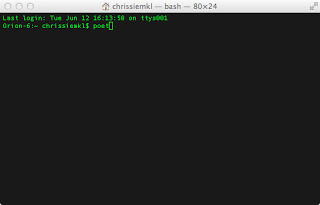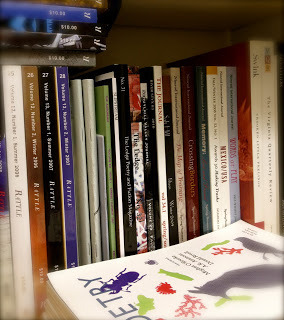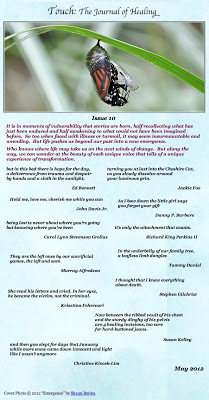Christine Klocek-Lim's Blog, page 14
December 20, 2012
November Sky Blog becomes ChristineKlocekLim.com

For blog posts, information about me (Christine Klocek-Lim), Poem Sparks, and anything new I have to say, please click through to my new website:
ChristineKlocekLim.com
See you on the other side!
Published on December 20, 2012 13:13
My new website–> ChristineKlocekLim.com!
Welcome to my new website! It’s been a long time coming and I’m sorry I have to pack my old one away in its virtual trunk, but when technology changes, so too must we. I originally created November Sky with Dreamweaver, I think. I may have used something before that, but I no longer [...]

Published on December 20, 2012 12:32
October 19, 2012
Ode to my children
Warning: incredibly sappy blog post ahead.

My older kid's 18th birthday is tomorrow. In January, my younger son will turn 16. The thing is, I'm not the kind of person who looks backward a lot. Sure, I remember when they were babies (okay, I remember the screaming and the legos and the giggling), but I don't have photos hanging on my wall or propped up on my desk. If I want to look at baby pictures, I have to go dig them out. The photo up above? I haven't set eyes on that one in maybe ten years. It's from 1995. Jeremy was 1 year old.
The surest way to grieve the past is to focus on it incessantly. The first thing that usually pops into my head when I think about the boys being little is all the times they almost died. Which, just, no. I'm not going to focus on that. Maybe it's different for other parents. Maybe their kids don't have allergies or heart defects or possible Marfan's or that brain damage incident or whatever, but I've had all too many close calls with the great black hole of grief to ever go poking at the beast on purpose. I want to focus on the good stuff. Usually that's the stuff that's happening right now in front of me.
Both of my kids are crazy intelligent. I don't really know how to explain what this is like. It leads to unexpected conversations and sometimes devices that scare the shit out of me being left on the steps and the odd sensation of knowing that they can solve math problems in their head (how do they do that?). A lot of people talk about having intelligent kids and everyone (according to the articles I read) wants intelligent kids, but many of them, when faced with the reality, pretty much are like: WTF. Hey kid, why won't you follow the directions on the box? Why is it so hard for you to listen and do all the stuff everyone else does at your age?
Smart kids are difficult. Directions are boring. Putting things together the way you're supposed to is boring. Toys with instructions are boring. Games are infuriating and boring (until you figure out how to reprogram them). These kids do weird shit like talk when they're six months old or not talk at all until they're four years old (then they speak in complete sentences with multisyllabic words that most adults don't use or understand). They're BORED all the time. School is usually BORING BORING BORING and "I've already read the entire textbook and this class is pointless now, Mom" by the third week of September.
A lot of people have bright kids. Not many people dodge school officials and psychologists like I've had to for the past sixteen years because really smart kids are kind of ... not normal. Doctor's charts have been a source of hilarity in my house for years. I've had to read up on my college statistics class so I could understand what the hell outlier meant. The funniest thing about all of this? No one believes you. Smart kids are supposed to get straight As. Most of them don't. Smart kids are supposed to just be brilliant, easily, in totally predictable ways. They're not.
Smart kids hate having to learn how to do things that are tricky, like riding a bicycle or tying their shoes or using a pencil (though scissors can be mastered at age one year). That stuff that requires muscle memory and practice is torture. Smart kids can intelligently discuss physics and the socio-political jokes from The Daily Show in their early teens, but learning how to grocery shop? Not so much. Smart kids figure out how to fool their teachers in kindergarten, but butt heads with their eighth-grade homeroom teacher. It's kind of weird and cool and terrifying, at the same time.
As a parent, I have learned how to roll with most of this. I harp on the important things: don't forget your epi-pen. Don't expect the world to make sense. Learning that people act irrationally most of the time is, perhaps, the hardest thing to teach them. I even stumble over that one, still.
It's weird, though, getting to this point. A parent of kids like this must be hyper-aware of the things society expects from children at certain ages, and know how to either hide their kids' peccadillos or not give a shit, depending on the situation. My job has been to keep them away from the "specialists" and do-gooders, so that they can figure out who they are without the labeling that seems so prevalent these days. I wanted them to be bored at the right times. Slotting kids like mine into piles of activities makes them crazy (and me, too) and doesn't help them figure out how to calm their racing brain at midnight enough to sleep.
I worked hard at showing them how cool it is to learn new things on their own because I'm convinced that public education, in many cases, is intent on stifling that urge. Jeremy reads the same books I do, the kind of books you don't get to crack open in school until you're in college or beyond. Zachary doesn't like to read (which everyone thinks is at odds with being smart, and really isn't) so I spend a lot of my time talking to him about online gaming and the internet and watching hilarious videos that he sends me and discussing the ethics of a modern society versus hunter-gatherer cultures among other things.
I spend a lot of breath forcing them to relax and take a break and not to worry so much about school. I have never been so convinced as I am now that education in our society and a love of learning is mostly incompatible. Public education teaches to the average and to the below-average. Gifted education? Hah. It's a joke. It mostly consists of piling more BORING projects that require colored pencils and poster board on top of the regular classroom work.
All of this is to say one thing: I HAD NO IDEA what I was getting into. Dear everyone who wants a baby: the pitter patter of little feet thing is a LIE. Sometimes they crawl. Sometimes (like Jeremy), they never crawl, they roll. Sometimes they BREAK THEIR CRIB (Zachary did this. I'm not kidding) or figure out how to flip over their pack-n-play. They take apart their plasma night-light. They invent their own language and would rather go to a museum than have a birthday party.
My kids did NONE of the things everyone told me they would do. But you know what? I don't mind. They're the most interesting people I've ever met. I can't wait to see what we do together tomorrow.

My older kid's 18th birthday is tomorrow. In January, my younger son will turn 16. The thing is, I'm not the kind of person who looks backward a lot. Sure, I remember when they were babies (okay, I remember the screaming and the legos and the giggling), but I don't have photos hanging on my wall or propped up on my desk. If I want to look at baby pictures, I have to go dig them out. The photo up above? I haven't set eyes on that one in maybe ten years. It's from 1995. Jeremy was 1 year old.
The surest way to grieve the past is to focus on it incessantly. The first thing that usually pops into my head when I think about the boys being little is all the times they almost died. Which, just, no. I'm not going to focus on that. Maybe it's different for other parents. Maybe their kids don't have allergies or heart defects or possible Marfan's or that brain damage incident or whatever, but I've had all too many close calls with the great black hole of grief to ever go poking at the beast on purpose. I want to focus on the good stuff. Usually that's the stuff that's happening right now in front of me.
Both of my kids are crazy intelligent. I don't really know how to explain what this is like. It leads to unexpected conversations and sometimes devices that scare the shit out of me being left on the steps and the odd sensation of knowing that they can solve math problems in their head (how do they do that?). A lot of people talk about having intelligent kids and everyone (according to the articles I read) wants intelligent kids, but many of them, when faced with the reality, pretty much are like: WTF. Hey kid, why won't you follow the directions on the box? Why is it so hard for you to listen and do all the stuff everyone else does at your age?
Smart kids are difficult. Directions are boring. Putting things together the way you're supposed to is boring. Toys with instructions are boring. Games are infuriating and boring (until you figure out how to reprogram them). These kids do weird shit like talk when they're six months old or not talk at all until they're four years old (then they speak in complete sentences with multisyllabic words that most adults don't use or understand). They're BORED all the time. School is usually BORING BORING BORING and "I've already read the entire textbook and this class is pointless now, Mom" by the third week of September.
A lot of people have bright kids. Not many people dodge school officials and psychologists like I've had to for the past sixteen years because really smart kids are kind of ... not normal. Doctor's charts have been a source of hilarity in my house for years. I've had to read up on my college statistics class so I could understand what the hell outlier meant. The funniest thing about all of this? No one believes you. Smart kids are supposed to get straight As. Most of them don't. Smart kids are supposed to just be brilliant, easily, in totally predictable ways. They're not.
Smart kids hate having to learn how to do things that are tricky, like riding a bicycle or tying their shoes or using a pencil (though scissors can be mastered at age one year). That stuff that requires muscle memory and practice is torture. Smart kids can intelligently discuss physics and the socio-political jokes from The Daily Show in their early teens, but learning how to grocery shop? Not so much. Smart kids figure out how to fool their teachers in kindergarten, but butt heads with their eighth-grade homeroom teacher. It's kind of weird and cool and terrifying, at the same time.
As a parent, I have learned how to roll with most of this. I harp on the important things: don't forget your epi-pen. Don't expect the world to make sense. Learning that people act irrationally most of the time is, perhaps, the hardest thing to teach them. I even stumble over that one, still.
It's weird, though, getting to this point. A parent of kids like this must be hyper-aware of the things society expects from children at certain ages, and know how to either hide their kids' peccadillos or not give a shit, depending on the situation. My job has been to keep them away from the "specialists" and do-gooders, so that they can figure out who they are without the labeling that seems so prevalent these days. I wanted them to be bored at the right times. Slotting kids like mine into piles of activities makes them crazy (and me, too) and doesn't help them figure out how to calm their racing brain at midnight enough to sleep.
I worked hard at showing them how cool it is to learn new things on their own because I'm convinced that public education, in many cases, is intent on stifling that urge. Jeremy reads the same books I do, the kind of books you don't get to crack open in school until you're in college or beyond. Zachary doesn't like to read (which everyone thinks is at odds with being smart, and really isn't) so I spend a lot of my time talking to him about online gaming and the internet and watching hilarious videos that he sends me and discussing the ethics of a modern society versus hunter-gatherer cultures among other things.
I spend a lot of breath forcing them to relax and take a break and not to worry so much about school. I have never been so convinced as I am now that education in our society and a love of learning is mostly incompatible. Public education teaches to the average and to the below-average. Gifted education? Hah. It's a joke. It mostly consists of piling more BORING projects that require colored pencils and poster board on top of the regular classroom work.
All of this is to say one thing: I HAD NO IDEA what I was getting into. Dear everyone who wants a baby: the pitter patter of little feet thing is a LIE. Sometimes they crawl. Sometimes (like Jeremy), they never crawl, they roll. Sometimes they BREAK THEIR CRIB (Zachary did this. I'm not kidding) or figure out how to flip over their pack-n-play. They take apart their plasma night-light. They invent their own language and would rather go to a museum than have a birthday party.
My kids did NONE of the things everyone told me they would do. But you know what? I don't mind. They're the most interesting people I've ever met. I can't wait to see what we do together tomorrow.
Published on October 19, 2012 08:04
Ode to my children
Warning: incredibly sappy blog post ahead. My older kid’s 18th birthday is tomorrow. In January, my younger son will turn 16. The thing is, I’m not the kind of person who looks backward a lot. Sure, I remember when they were babies (okay, I remember the screaming and the legos and the giggling), but I [...]

Published on October 19, 2012 07:04
June 12, 2012
Publish online and kiss your Pushcart goodbye

This past April I did an interview series for National Poetry Month. During the series, one of the questions I asked was this:
Do you think there is a disconnect between academic poets/poetry and online poets/poetry?
Some of the people I interviewed declined to answer. Some said "I don't know." Some gave an in-depth explanation of why they thought there was a disconnect or not. In general, many of the people I interviewed truly believed that if there is still a disconnect in any way, it will not be around for much longer because the internet has become so much a part of our lives.
I'm not so sure.
It is human nature to strive for status. It is part of our psyche to work toward success because it brings with it so many rewards: respect, wealth, power. In an evolutionary world, this means that one's offspring has a better chance of survival if one has power.
In a literary sense, the definition of success has traditionally meant publish, publish, win awards, publish, win some more awards, etc. The more one publishes, the more one's work has a chance of survival long after the writer has died.
The introduction of a radically new medium (online publishing) into an established and entrenched process has upset this balance of power. The hegemony of traditional literary establishments is slowly eroding as the prevalence of online opportunities expands. The question is whether the traditional establishments will adapt and survive or hang on so tightly that they slow down the process of change. I think it can go either way: some will adapt and some will fossilize their procedures (publishing, awards, etc.), thus preserving their traditional authority for at least a while longer.
(One need only to read the many articles about the arrival of ebooks and the hysteria that is gripping traditional publishing houses (see the brouhaha surrounding Amazon, the big six, and the Department of Justice) to realize that a similar upset is slowly gripping the literary publishing world as well. What most people don't realize is that the tipping point for commercial fiction is already here.)
Just recently, I received an email from The Fox Chase Review. This lovely online journal posted a blog entry in which they explained why they would no longer be sending work to the Pushcart Prize anthology. This decision was because of a statement from Bill Henderson in the introduction of the 2012 Pushcart anthology:
“I have long railed against the e-book and instant Internet publication as damaging to writers. Instant anything is dangerous—great writing takes time. You should long to be as good as John Milton and Reynolds Price, not just barf into the electronic void.”
-Bill Henderson – The Pushcart Prize 2012 Introduction..
The Fox Chase Review's response:
The internet has opened a door to poets/writers in this new time. There are many fine publications who publish only on the net and are not easily entered. Rejection rates far outnumber acceptance rates. Henderson’s void is an opportunity for various styles of writing to emerge that may not have found a home in more elitist presses which I am sorry to say The Pushcart has now become through the voice of Bill Henderson. The Fox Chase Review will no longer submit entries to The Pushcart Prize and we hope Henderson doesn’t continue to barf on his computer.
Clearly, a miasma still lingers around online publication of poetry. It will be interesting to see how long it takes before this barrier between online and academic/print establishments falls. I suspect it will be several decades yet.
Meanwhile, I'll be over here quietly writing poems and being unutterably grateful I don't hold a position where I must publish in the right places (meaning print/academic/pushcart/poetry/newyorker) or perish.

Published on June 12, 2012 13:32
Publish online and kiss your Pushcart goodbye
This past April I did an interview series for National Poetry Month. During the series, one of the questions I asked was this: Do you think there is a disconnect between academic poets/poetry and online poets/poetry? Some of the people I interviewed declined to answer. Some said “I don’t know.” Some gave an in-depth explanation [...]

Published on June 12, 2012 12:32
June 5, 2012
Starbursts and Fox Chase Review

No, no, not the candy! And not actual stars, either, although that's the original inspiration for my poem, now appearing in Fox Chase Review, Summer 2012: "Starburst in a dwarf irregular galaxy."
In this issue you can find work by: A.D. Winans, Anthony Buccino, Elijah Pringle, Frank Wilson, James Arthur, James Quinton, Jane Lewty, Jim Mancinelli, John Dorsey, Le Hinton, Melanie Huber, Mel Brake, Nicholas Balsirow, Russell Reece, Stephen Page, and Stevie Edwards.
Fox Chase Review also did an interview with me recently: Ten Questions for Christine Klocek-Lim. In the interview I mention how much I hate doing readings. This is terribly ironic because I will also be doing a reading for Fox Chase Review next year. (Thank goodness it's next year! Procrastination is your friend! Yeah!)
Published on June 05, 2012 05:00
Starbursts and Fox Chase Review
No, no, not the candy! And not actual stars, either, although that’s the original inspiration for my poem, now appearing in Fox Chase Review, Summer 2012: “Starburst in a dwarf irregular galaxy.“ In this issue you can find work by: A.D. Winans, Anthony Buccino, Elijah Pringle, Frank Wilson, James Arthur, James Quinton, Jane Lewty, Jim Mancinelli, [...]

Published on June 05, 2012 04:00
June 4, 2012
Poet in Residence - Touch: The Journal of Healing

A few months ago I received a call from the editor of Touch: The Journal of Healing. We've had a long and fruitful professional and personal friendship so I wasn't particularly surprised to be hearing from him. However, when he asked me if I would consider being the first Poet in Residence for his journal, I couldn't help but feel completely flabbergasted.
Me? I thought. What do I know? Yeah, sure I've written a lot over the years, but quantity doesn't always equal quality as so many of us know (have you seen the typos cropping up all over the web lately at large news/magazine sites?). Nevertheless, O.P.W. Fredericks persuaded me. He asked me to write a series of essays exploring one of the major themes of the journal: Evolution into Insight. How could I resist?
If you click through you will find my essay as well as three poems I wrote over twelve years. The poems all deal with one thing: my second son's congenital heart defect. As I said in the essay: "Never be satisfied with the first attempt." It took twelve years and many more poems than the three published in Touch to really become satisfied with my attempt at recording the trauma and subsequent emotional revolution that was born of my child's brush with death.
There are a lot of other great poems and artwork in Issue 10 of Touch: The Journal of Healing. Check out the Editor's Choice: Carol Lynn Stevenson Grellas. There is also work by: Ed Bennett, Jackie Fox, John Davis Jr., Richard King Perkins II, Danny P. Barbare, Pat St. Pierre, Tammy Daniel, Emily Lasinsky, Murray Alfredson, Stephen Gilchrist, Krisztina Fehervari, and Susan Kelley.
Published on June 04, 2012 07:02
Poet in Residence – Touch: The Journal of Healing
A few months ago I received a call from the editor of Touch: The Journal of Healing. We’ve had a long and fruitful professional and personal friendship so I wasn’t particularly surprised to be hearing from him. However, when he asked me if I would consider being the first Poet in Residence for his journal, [...]

Published on June 04, 2012 06:02



